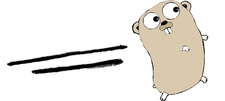Go version 1 series
Well Executed

© Lead Image CC BY-SA 3.0
The Go programming language helps programmers avoid the annoying routine and focus on the important stuff.
In 2009, Google launched the Go programming language [1]. An impressive collection of veteran developers worked on Go, including Ken Thompson (one of the inventors of Unix), Plan 9 co-creator Rob Pike, and Rob Griesemer, who previous worked on Google projects such as the Smalltalk variant Strongtalk.
The goal of Go was to create a statically typed language similar to C, but with updated features such as garbage collection and better type safety. In addition to its trademark CSP (Communicating Sequential Processes) [2] concurrency solution, the influences of Limbo [3] and Inferno [4] are evident.
Early versions of Go evolved at a rapid pace, with the code changing so fast that applications written one week would no longer compile in later versions. Finally, in 2012, Go 1.0 was released with the promise that you would be able to compile any code in future versions of the 1.x series. Since then, the focus of the Go developers has been on tools, compilers, and the run time.
[...]
Buy this article as PDF
(incl. VAT)
Buy Linux Magazine
Subscribe to our Linux Newsletters
Find Linux and Open Source Jobs
Subscribe to our ADMIN Newsletters
Support Our Work
Linux Magazine content is made possible with support from readers like you. Please consider contributing when you’ve found an article to be beneficial.

News
-
Introducing matrixOS, an Immutable Gentoo-Based Linux Distro
It was only a matter of time before a developer decided one of the most challenging Linux distributions needed to be immutable.
-
Chaos Comes to KDE in KaOS
KaOS devs are making a major change to the distribution, and it all comes down to one system.
-
New Linux Botnet Discovered
The SSHStalker botnet uses IRC C2 to control systems via legacy Linux kernel exploits.
-
The Next Linux Kernel Turns 7.0
Linus Torvalds has announced that after Linux kernel 6.19, we'll finally reach the 7.0 iteration stage.
-
Linux From Scratch Drops SysVinit Support
LFS will no longer support SysVinit.
-
LibreOffice 26.2 Now Available
With new features, improvements, and bug fixes, LibreOffice 26.2 delivers a modern, polished office suite without compromise.
-
Linux Kernel Project Releases Project Continuity Document
What happens to Linux when there's no Linus? It's a question many of us have asked over the years, and it seems it's also on the minds of the Linux kernel project.
-
Mecha Systems Introduces Linux Handheld
Mecha Systems has revealed its Mecha Comet, a new handheld computer powered by – you guessed it – Linux.
-
MX Linux 25.1 Features Dual Init System ISO
The latest release of MX Linux caters to lovers of two different init systems and even offers instructions on how to transition.
-
Photoshop on Linux?
A developer has patched Wine so that it'll run specific versions of Photoshop that depend on Adobe Creative Cloud.
